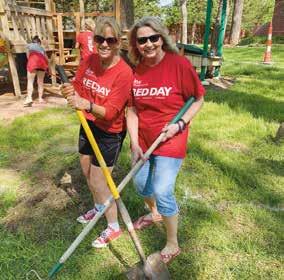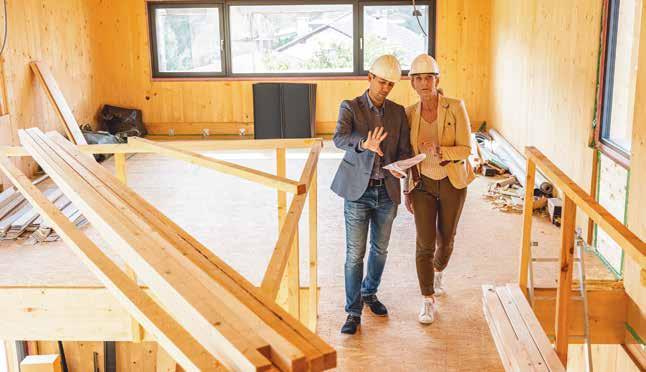

MAR/APR 2024 RREC-099 LOOKS CAN BE DECEIVING + Accessory dwelling units 9 + New home construction 22 + Homeowners associations 26 + Team vs. solo agents 30 Learn how to detect and fight back against fraud 18

SCAN TO REGISTER
The Residential Real Estate Divorce Specialist Certification program is designed to help agents learn the family law basics so they may be more effective when speaking with clients. It focuses on the various approaches to be taken and how to best navigate process.
CRS Designation: Earn 4 hours of credit!
Check if this course qualifies for continuing education credit in your state.
The content was exactly what I was looking for. I loved the videos and activities. I learned so much and can’t wait to try out my new skills!
LEARN SKILLS GAINED AT CRS.COM/DIVORCE


18 The Fight Against Fraud Agents must stay vigilant as fraud and scams become more prevalent in the residential real estate profession.
By Jason Henninger


FEATURES
22 From the Ground Up New home construction can be a profitable niche for real estate professionals who are willing to dedicate the time and effort.
By Myrna Traylor
26 The Advantages of HOA Access Relationships with homeowners associations can result in a treasure trove of leads and sales opportunities.
By Jason Henninger
30 To Team, or Not to Team?
Learn the pros and cons of working on a real estate team versus venturing in the industry as a solo agent.
By Scott Mason
Vol. 23, No. 2
Cover art: iStock.com/ i d-work
22 30 26
18
Mar/Apr 2024 1


9
4 Aerial View
Jeff Hornberger, RRC CEO
6 Real Talk Recap: What you missed from recent RRC podcast episodes.
Market Pulse
8 Personal Perspective: Paul Sidwell, CRS, RE/MAX Revolution, Kansas City, Missouri
9 Unlocking Property Potential: Adding an accessory dwelling unit (ADU) to a property can increase its appeal and value.
By Rebecca Lubecki
12 Go Green, Get Green: Knowing the ins and outs of green or eco-friendly homes can allow an agent to stand out among their peers.
By Rebecca Lubecki
16 Smart Living: Apps to help manage the finances of your real estate business.
34
Data
Dive
Insights from industry data.
Specialized Knowledge
36 Council Classroom: Learn how to craft a great buyer brokerage agreement.
38 Marketing Matters: Ways to ensure your business’s website is top-notch.

Designation Nation
40 Your Own Council: RRC news and updates.
42 Ask a CRS: Advice from the country’s top agents.
44 Find a CRS: Expand your network.
46 Balancing Act: Learn how to create and keep friendships as an adult.
48 CRS Cares: Sharing an RRC member’s contributions to their community.
EDITOR
Cheré LaRose clarose@crs.com 800.462.8841
ASSISTANT EDITOR
Amelia Garza apgarza@crs.com
CONTRIBUTING WRITERS
Jason Henninger
Rebecca Lubecki
Scott Mason
Myrna Traylor
BOARD OF DIRECTORS President
Tricia Nekota, CRS President-Elect
Vivian Macias, CRS
First Vice President
Teresa Pitt, CRS Immediate Past President
Holli Woodward, CRS Members
Debra Beagle, CRS
Ellis Gardner, CRS
Mark Gordon, CRS Bryan Hughes
Tonya Thomsen, CRS
Chief Executive Officer
Jeff Hornberger Staff Liaison
Patricia Stodolny
PUBLICATION MANAGEMENT
Advertising Inquiries
312.321.4410
bd@crs.com
The Residential Specialist is published for Certified Residential Specialists, general members and subscribers by the Residential Real Estate Council.
The magazine’s mission is: To be a superior educational resource for CRS Designees and members, providing the information and tools they need to be exceptionally successful in buying and selling residential real estate.
The Residential Specialist is published bimonthly by the Residential Real Estate Council, 430 North Michigan Ave., Suite 300, Chicago, IL 60611-4092. Periodicals postage paid at Chicago, IL, and additional mailing offices.
Change of address? Email requests to crshelp@crs.com, call Customer Service at 800.462.8841 or mail to RRC at the above address.
The Residential Specialist (USPS0021-699, ISSN 1539-7572) is distributed to members of the Council as part of their membership dues. Nonmembers may purchase subscriptions for $29.95 per year in the U.S., $44.95 in Canada and $89.95 in other international countries. All articles and paid advertising represent the opinions of the authors and advertisers, not the Council.
POSTMASTER: Please send address changes to:
The Residential Specialist, c/o Residential Real Estate Council, 430 North Michigan Ave., 4 th Floor, Chicago, IL 60611-4092.
www.glcdelivers.com
Publishing Manager
Scott Mason
Art Director
Ivette Cortes
COPYRIGHT 2024 by the Residential Real Estate Council. All rights reserved. Printed in U.S.A.
crs.com
Vol. 23, No. 2
CONTENTS
48
Mar/Apr 2024 2

SCAN TO REGISTER
The Probate Specialist Certification’s curriculum is designed to equip agents with the knowledge and skills necessary to navigate the complex probate process with confidence, empowering them to excel in this specialized niche.
CRS Designation: Earn 8 hours of credit!
Check if this course qualifies for continuing education credit in your state.
“Great course!! The instructors were informative and entertaining. I gained a lot of useful info! 5 STARS!”
~ Rachel Bruner, TN
LEARN SKILLS GAINED AT CRS.COM/PROBATE
“CRS Cares” will feature a wide range of activities and projects undertaken by CRS Designees.
Building Connections and Giving Back
In the RRC world of residential real estate, the value of community and connection cannot be overstated. CRS Designees and RRC members do much more than facilitate property transactions; they play a crucial role in building, shaping and nurturing the communities they serve. Recognizing this vital aspect of the industry, The Residential Specialist magazine has introduced a new column, “CRS Cares,” dedicated to showcasing the remarkable efforts of members making a significant impact in their communities.
The essence of “CRS Cares” is to highlight the spirit of giving back and building connections beyond the confines of business transactions. It’s about the stories of members who have gone the extra mile to make a difference, whether through volunteer work, charitable initiatives or innovative community projects. This column aims to inspire and encourage real estate professionals to look at their roles through a lens of community engagement and social responsibility.
One of our key motivations is recognizing that residential real estate professionals possess unique insights into the communities they work in. They understand the local needs, challenges and opportunities better than anyone else. This knowledge positions them perfectly to lead or support initiatives that enhance community well-being, from affordable housing projects to environmental sustainability efforts.
“CRS Cares” will feature a wide range of activities and projects undertaken by CRS Designees. These stories will not only celebrate their achievements but also serve as a blueprint for others in the industry looking to make a similar impact. Whether it’s organizing neighborhood clean-up drives, supporting local schools or aiding in disaster recovery efforts, the column will cover how you contribute to positive change.
Moreover, “CRS Cares” is not just about highlighting good deeds; it’s about

fostering a culture of community involvement within the real estate industry. By sharing these stories, we hope to amplify your contributions to socially responsible and community-focused business practices. It’s about showing that success in real estate is not just measured by sales and commissions but also by the positive impact one has on one’s community.
The column will also provide practical advice and resources for CRS members interested in initiating or participating in community service projects. This could range from guidance on partnering with local organizations to tips on mobilizing resources and support for causes. The column inspires and acts as a practical guide for impactful community engagement.
“CRS Cares” is more than just words on a page; it demonstrates real estate professionals’ role in community building. It invites CRS Designees and RRC members to share their stories of hope, resilience, compassion and joy showcasing the profound difference we can make by caring for the communities we call home.

Aerial View From
of
the desk
Jeff Hornberger, RRC CEO
The Residential Specialist trsmag.com Mar/Apr 2024 4
On page 48 of this issue, read about Shelee Brim, CRS (left), and her efforts to give back to her community through acts of service.
REAL ESTATE REAL TALK
CUT THROUGH THE NOISE & STAY IN THE KNOW NEWS | TRENDS | EXPERTISE
PRODUCED BY
Have you been listening to RRC’s “Real Estate Real Talk” podcast? If you’re late to the party or forgot to tune in, here’s a peek at what our expert CRS hosts have been discussing in recent episodes.
What You Missed on “Real Estate Real Talk”
Season 2, Episode 23
“Breaking Down Communications — Talking to Buyers Today”
Season 3, Episode 1
Listen to new episodes and access the entire archive of “Real Estate Real Talk” episodes at CRS.com/realtalk or wherever your favorite podcasts are found.
A lot of agents don’t even know what a buyer’s agency contract is. Agents will say, “We don’t have a buyer’s agency agreement.” Yeah, we do. You have it signed every single time. But they don’t understand what it even says in the form because, typically, buyers say, “All right, the price, closing date, everything else looks good—sign, sign, sign.” And they’re done. I do believe part of it is training. And the other big part is that we have to stop saying we represent buyers for free.
“Wealth Wisdom: Teaching Financial Literacy”
 Alex Milshteyn, CRS
Alex Milshteyn, CRS
Season 2, Episode 24
“Let’s Get Real”
Mental health is important to me. That [feeling] didn’t come until the beginning of COVID, when I really learned that lesson because I had gotten pretty burned out. But that is part of what I love about what we do now. It’s that cliche of, “You make your own success”—but you do. You can set boundaries. You can set the hours that you will work. And I do believe that, in most cases, consumers will respect that if they know what those boundaries are.
 Maura Neill, CRS
Maura Neill, CRS

There are so many people who would probably assume that you know every single aspect of this industry, including finance. And I think there is a misconception—and where we have challenges—when I hear real estate agents speaking about things that are outside their area of expertise. We have to be so careful about that. We must have the best partners in place because not everyone is an expert in financial literacy.
Holli Woodward, CRS
Season 3, Episode 2
“Peering
into the Past, Present and Future”
For you as a CRS, over the next 12 months, you have to become what you were back in 2005 or 2006 with [communication around] days on the market. A lot of these sellers think their home is going to sell in the first seven days, when now we know that we’re marathon people. I always say that the CRS who can keep the seller the happiest for the longest amount of time is the one who’s going to see the best return for their business.
 Brian Copeland, CRS
Brian Copeland, CRS
Real Talk Recap Thoughts and opinions from our podcast hosts The Residential Specialist trsmag.com
Mar/Apr 2024 6
PERSONAL PERSPECTIVE
After moving often as a child, Paul Sidwell, CRS, has put down roots in his community of Kansas City, Missouri.
PAGE 8

Market Pulse
TRENDING HEADLINES AND IDEAS
ACCESSORY DWELLING UNITS
Agents who are experts on accessory dwelling units can help raise the value of a client’s home.
PAGE 9
GREEN HOMES
Knowing how to sell and market eco-friendly homes can make you the go-to agent for those who want green features.
PAGE 12
SMART LIVING
Learn which apps are best for residential real estate agents who are looking for financial management help.
PAGE 16
Nicole Bissey Photography
Residential Real Estate Council crs.com Mar/Apr 2024 7
Paul Sidwell, CRS
RE/MAX Revolution, Kansas City, Missouri
How did you get involved in real estate?
How are you involved in Council activities?
I think the CRS Designation is critical to committing to this profession.”
I began my real estate career right out of high school when I got into remodeling homes.
I lived in Florida, and a hurricane came through and just destroyed my area. Later, I moved to Kansas City and got into retail. I started reading books to improve myself, and several authors were former real estate professionals.
I started thinking, “Well, I know about houses and selling and connecting with people. Why not put the two together?”
I earned my license in 2014 and haven’t looked back.
How did you become interested in the CRS Designation?
I was the 2023 finance leader for the Kansas RRC because, at the time, I was at an office in Kansas. Now, I’m in Missouri, which is where I live and practice most of my real estate, and I’m the 2024 president of Missouri RRC.
I think the CRS Designation is critical to committing to this profession. With real estate, there are easy and hard days— and during the hard days, we try to talk ourselves out of sticking with it. But having that commitment through a foundation of education is one more link in the chain connecting me to the real estate business.
Does your market have any interesting or unique aspects to it?
The first thing that comes to mind is that Kansas City, Missouri, is geographically very large. It covers four counties and more than 310 square miles, and much of that up in the Northland where I practice is undeveloped. Anyone who lives or works in Kansas City, Missouri, pays a 1% earnings tax. Even though they might live in a subdivision with tons of homes and streetlights, the city still has to provide infrastructure and fire and police services to the more remote areas. So, I help people run the numbers on their homes because they’ll probably pay more for a home to avoid paying that 1% earnings tax just to simplify their lives.
needs bunk beds, for example. In addition, for the Replenish KC backpack drive this year, we collected over 500 backpacks full of school supplies kids would need for the whole year. Then, we delivered them to the school, which distributed them. Kids can come in, and there’s no shame. It’s just awesome.
How do you feel about having established a business in your town?
Paul Sidwell, CRS, achieved the CRS Designation in 2020. He can be reached at paul@ sidwellhomes.com or 816-812-4865
In 2018, I changed offices, and one of our top producers in that office was a CRS. And that got me thinking, “If the CRS Designation has helped her, I should look into that.” Education is important. Long story short, I was just following the leader.
I was just in Anaheim for the NAR: NXT conference and met tons of great real estate professionals from all over the country. Everybody’s willing to share what’s working in their business. There’s no secret to this. Just having the idea is useless if you don’t do anything with it.
Are you involved in any community service activities?
My family and I are involved with the Care Portal, which connects families and individuals in need with resources. Social workers let Care Portal know that somebody has an emergency foster situation and
Growing up, my dad was in the military, so we moved around all the time. So, that’s another piece of my real estate story—moving around growing up. I’ve been in Kansas City for 23 years now. About four or five years after moving here, I felt the itch to move again. Then I realized I didn’t have to move. I get to stay here. I had to work through that and find value in my community. Because if it’s just about me, I can just pick up and move. But there are people here, and I am committed to things. I realized starting a real estate business would plant roots for me and my family so they may experience a way of life that I didn’t.
Personal Perspective Profiles of people to watch MARKET PULSE
The Residential Specialist trsmag.com Mar/Apr 2024 8
Unlocking Property Potential
 By Rebecca Lubecki
By Rebecca Lubecki
Homeowners and residential real estate agents alike are often looking to increase a property’s monetary value or its utility. For some, those desires can be fulfilled by creating an accessory dwelling unit (ADU). ADUs are additional living spaces added to a homeowner’s property to provide extra income as a rental or more space for their own family. While they’re not legal in every city or county, ADUs are increasing in popularity as more jurisdictions allow for their construction, and agents should take notice and prepare properly.
Alison Wisnom, CRS,
broker at Coldwell Banker Realty in Annapolis, Maryland, explains what agents need to know and the benefits their clients can gain from legalizing ADUs.
“ADUs could be very popular in our market, except that most jurisdictions don’t allow them. My city has allowed them only for the past two years. The county I live in has allowed them only for the past few months. There’s no statewide policy for them within single-family zoning,” Wisnom says. “We have different rules around the state, and many places are not allowing them at all, so it’s difficult to navigate.”
Additional value for homeowners Accessory Dwelling Units
associate
iStock.com/Eoneren Residential Real Estate Council crs.com Mar/Apr 2024 9

Why are ADUs illegal in some areas?
So why do these strict laws against ADUs exist in the first place? According to Wisnom, it goes back to the history of zoning.
“Zoning was intended originally to restrict incompatible uses for health and
How clients benefit
safety purposes. You don’t want a train track running down the middle of the street where your kids play or a chemical plant next to your house,” she explains. “Historically, in our country, local officials have also instituted other kinds of restrictions on how people can use their properties.”
While zoning laws have come under criticism in recent years for their class and racial biases, they still exist. Wisnom says one reason ADUs get pushback is that some are used as rental properties for extra income. A negative connotation associated with renters is that they’re more transient or less wealthy. There are also concerns that with more people living in these additional housing units, parking spaces will decrease or additional improvements like ADUs will increase property taxes in the community. But well-managed ADU policies exist, and we can take lessons from them.
Depending on your client’s situation, an ADU could be a key make-or-break decision. A home with an ADU (or potential to add one) can provide a huge benefit for families with:
Elderly parents or grandparents
Adult children with disabilities
Adult children returning home
Live-in caregivers
ADUs give families the flexibility to offer certain family members or caregivers the privacy they need while remaining together. They can also be a great option for those who want to rent out part of their home to help pay their mortgage.
MARKET PULSE Accessory Dwelling Units Additional value for homeowners
a listing expert with RRC’s Residential Listing Certification at CRS.com/ certifications
Become
space)
Need for supplemental income (renting out the
Need for a flex space, like a guest room or home office
iStock.com/Andrii Yalanskyi/bsd studio The Residential Specialist trsmag.com Mar/Apr 2024 10
HOW ADUs BOOST VALUE
Alison Wisnom, CRS, associate broker at Coldwell Banker Realty in Annapolis, Maryland, shares some types of accessory dwelling units (ADUs) that bring additional utility and value to homes:
❶ Basement apartment: This involves a separate entrance through a walk-out or walk-up basement. It may not be accessible to the main home from the inside, but it is usually less expensive to construct.
❷ Garage conversion: These can be detached or attached. This option deducts parking value, so other parking solutions should be considered. Clients should know it may be expensive if the existing structure needs to be heavily modified.
❸ Detached ADU: This stand-alone facility can offer homeowners the most flexibility and value, but it can be more expensive to construct a new structure.
❹ Junior ADU: These are attached to the main home but smaller. A typical example is a sun porch or home addition. These may share some spaces and utilities with the rest of the house.
What agents should know
ADUs may not be a good fit for everyone, but not offering them as an option limits a home’s potential utility and value for the owner and further restricts the housing supply. That’s why residential real estate professionals must know the rules in their local markets.
“For example, I had a client who wanted to buy a single-family home outside Baltimore. The seller had moved his mother into his basement so he could help her, and she had a second kitchen that was not allowed in that location. When the
appraiser came, the owner was required to remove the gas stove,” she says. “This person wasn’t allowed to use his property in a way that he has a legitimate need to.” Agents should also get involved with their local government to create zoning solutions that serve their clients in the long run.
“It’s a government restriction on what a person is allowed to do with the property that they bought,” Wisnom says. “You should be able to use your property in the way you need, as long as it’s not affecting your neighbors’ use and enjoyment of their properties.”
❶ ❷ ❸ ❹ iStock.com/UnitoneVector Residential Real Estate Council crs.com Mar/Apr 2024 11
Go Green, Get Green
By Rebecca Lubecki
In today’s market, customers increasingly prefer eco-friendly and energy-efficient products and services. This trend also extends to their preferences for homes. To meet the demands of these environmentally conscious clients , real estate agents must gain a deep understanding of the features that appeal to those seeking a green home. Additionally, agents should devise effective marketing strategies to promote and market these environmentally friendly properties.
John Young, CRS, a sales agent at RE/ MAX Excellence Realty in Silver Spring, Maryland, explains, “I think there is a huge interest, but people aren’t coming to me and specifically saying that ecofriendly features are a ‘make or break’ for them when they shop for a home.”
Overall, Young emphasizes that buyers’ desire for eco-friendly homes remains mixed and to know your audience. “If I mention an induction range or a tankless water heater, buyers know what I’m talking about and respond to it,” Young says. “But then there are people on the other side who have no idea, and I’m the one having to educate them. It’s going to get overlooked by a lot of people.”
The clients seeking greener homes
While buyers’ desire for eco-friendly homes remains 50/50, the preference can depend on age, geographic location and other factors. One is that many of these greener features, such as LED lightbulbs and Wi-Fi thermostats, have become standard, and buyers aren’t viewing these as “eco-friendly” anymore.
GET SMART, GET CERTIFIED
One way consumers can make their homes more eco-friendly is by installing smart home technologies throughout their properties. For agents who may not know much about how to market a smart home, RRC has them covered.
RRC’s Smart Home Certification demonstrates to buyers and sellers that an agent is dedicated to developing expertise about the technology, privacy issues and best transition tactics to help with a smart home sale. Training and certification increase your technical and listing skills and add value for the clients you represent by equipping you with the skills and tools to identify what qualifies as a smart home and advise them on how to value the technology. The Smart Home Certification will also help differentiate you from your peers.
MARKET PULSE
Green Homes Eco-friendly home trends
iStock.com/innni The Residential Specialist trsmag.com Mar/Apr 2024 12
Residential Real Estate Council crs.com Mar/Apr 2024 13
ENERGYEFFICIENT FEATURES TO LOOK FOR
f Solar panels
f Energy-efficient lightbulbs
f Energy-efficient appliances
f Smart thermostats
f Double-glazed windows
f Low-flow water fixtures
f Insulation
Learn more about RRC’s Smart Home Certification at CRS.com/learn/ certificates/ smart-homecertification
“I have never had a client reject a property over not having green features,” says Fred LaBell, CRS, a broker associate at HomeSmart Elite Group in Scottsdale, Arizona. “Most homes we see today already have some smart features, like Wi-Fi thermostats, video doorbells, Wi-Fi garage door openers and more. And solar power in Arizona is questionable because of initial cost, service, transferability and warranties.”
LaBell adds that most of his clients make decisions based on location and price. For the ones seeking out those eco-friendly features, Young says one feature to pique their interest is an electric vehicle charger, as more young people drive hybrids and electric cars.
“We used to say, ‘Well, here’s the garage.’ But now, when they walk in, buyers ask, ‘Does it have an electric car charger?’ So that’s a green element that more people want.” Young mentions that tankless water heaters, smart home technology and induction cooktops are greener features that are also growing in popularity.
Young says he notices the younger buyers are seeking eco-friendly additions. “In conversations with these clients, I feel like that’s
important to them. They say, ‘I feel I have a responsibility to do whatever I can. And if I can contribute by making my house greener, cutting down on my carbon emissions and doing things like that, I’m interested.’”
These features are favored not only because they can save them money in the long run but also because they feel like it’s doing something positive for the environment, Young says.
Working with sellers
But what should residential real estate professionals know if they’re working with sellers?
“The way I approach this with a seller is I always ask, ‘What do I need to know about your house that you’ve done in the form of improvements that I might not know?’ Because I can see if solar panels are on the house, but I might not see something else they did, like spray foam insulation in their attic,” Young says. “If they tell me these things, I can use them to market their house. I can put verbiage in the listing to say that the insulation was brought up to current standards or better.”
MARKET PULSE
iStock.com/chokkicx/elenabs The Residential Specialist trsmag.com Mar/Apr 2024 14 Green Homes Eco-friendly home trends
Business Outlook for 2024
According to a new survey from Inman, the Inman Intel Index, residential real estate professionals are, on the whole, sticking with confirmed methods of generating business in a down market.
Old-school networking is still regarded as a preferred tactic for generating leads and making the contacts so crucial to business success in the real estate industry. More than half (53%) of the survey respondents said that networking offered the best return on
the time and effort they spent on the activity, compared to 16% who preferred social media and 7% who bought leads or used lead-generation software.
Face-to-face (or phone-to-phone) networking has proven useful in recent months—41% of respondents say they will continue or increase this method—while a slightly smaller percentage (31%) plan to increase their social media presence, and 10% will boost their open house availability.

STAT SNAP
Respondents were allowed to select multiple answers Source: Survey results from Inman Intel Index, Sept. 23 to Oct. 1, 2023
% Networking BEST ROI FOR TIME/ MONEY SPENT TO MAKE CONNECTIONS IN 16% Social media 7 % Buying leads/ lead-gen software TACTICS THAT WILL BE BEST FOR ROI IN 41% Networking 31% Social media 10% Open houses 9% Buying leads/ lead-gen software 9% Other iStock.com/Pekic Residential Real Estate Council crs.com Mar/Apr 2024 15
53
5 Apps Revolutionizing Financial Management
In the fast-paced world of real estate, effective financial management is crucial for success. Real estate agents constantly juggle various financial aspects, from budgeting and expense tracking to managing commissions and optimizing investments. Fortunately, technology has come to the rescue with a plethora of applications designed to streamline financial tasks and enhance overall efficiency. Here are the top five apps that every agent should consider integrating into their financial toolkit.

QuickBooks Self-Employed is a powerhouse for real estate professionals who manage their own finances. Tailored for self-employed individuals, this app simplifies income and expense tracking, helps organize receipts and provides insights into tax deductions specific to the real estate industry.
KEY FEATURES:
f Automatic expense tracking: Connect your bank accounts and credit cards to categorize and track business expenses automatically.
f Mileage tracking: Helps to log your miles and turn them into potential tax deductions.
f Tax estimation: Receive real-time estimates based on your income and deductions to help you plan and budget effectively.


Smart Living Tactics for professional growth MARKET PULSE
iStock.com/Prostock-Studio The Residential Specialist trsmag.com Mar/Apr 2024 16
1
2
This comprehensive expense management app simplifies the process of tracking, submitting and reimbursing business expenses. It’s a valuable tool for real estate agents who want to stay organized and maximize their deductions.
KEY FEATURES:
f Receipt scanning: Use your smartphone to capture receipts, and Expensify will automatically extract and categorize the relevant information.
f Expense reports: Create detailed and professional expense reports with just a few clicks, making it easy to submit documentation for reimbursement or tax purposes.
f Integration with accounting software: Seamlessly integrate with accounting software like QuickBooks for a more streamlined financial workflow.
3

Stessa is a real estate investment management app that assists agents in tracking income, expenses and overall property performance. Whether you’re managing one property or a portfolio, Stessa provides valuable insights to optimize your real estate investments.
KEY FEATURES:
f Income expense tracking: Monitor cash flow, track expenses and get a clear picture of your property’s financial health.
f Document organization: Store and manage important documents related to your properties, such as leases, contracts and invoices.
f Performance analytics: Analyze property performance over time with visual dashboards and customized reports.
4

While not exclusively a financial app, CamScanner is an invaluable tool for real estate agents dealing with a mountain of paperwork. It turns your smartphone into a portable scanner, allowing you to digitize and organize important documents on the go.
KEY FEATURES:
f High-quality scanning: Capture high-resolution scans of documents, receipts, contracts and more.
f Optical character recognition (OCR): Convert scanned documents into editable and searchable text, making it easy to find specific information.
f Cloud storage integration: Automatically sync scanned documents with cloud storage services for easy access and backups.
5

Mint is a popular personal finance app that offers a holistic view of your financial life. It’s an excellent choice for real estate agents who want to manage both their professional and personal finances in one place.
KEY FEATURES:
f Budgeting tools: Set budgets and receive alerts when approaching or exceeding your spending limits.
f Credit score monitoring: Stay on top of your credit health with regular updates on your credit score and personalized tips for improvement.
f Financial goal tracking: Whether you’re saving for a down payment or planning for retirement, Mint helps you set and track financial goals.
Technology has come to the rescue with a plethora of applications designed to streamline financial tasks and enhance overall efficiency.
Residential Real Estate Council crs.com Mar/Apr 2024 17
iStock.com/id-work The Residential Specialist trsmag.com Mar/Apr 2024 18
THE FIGHT
AGAINST FRAUD
By Jason Henninger
Anywhere there are financial transactions, the threat of fraud comes with them.
Real estate is no exception; high-dollar sales mean creative con artists bring their A-game. To prevent falling victim to fraud, real estate agents must clearly understand what types of scams are out there. But perhaps even more important is to gain recognition of the red flags that come up when facing the most common types of fraud and to be vigilant in verifying the facts.
—Dallison Veach, CRS
You have to be very careful and do your due diligence when you’re contacted.”
Residential Real Estate Council crs.com Mar/Apr 2024 19



Use a Verification App
One way to fight scams is to use identity verification systems, such as Plaid, Tenable or Forewarn. These apps can take the guesswork out of risk assessment by quickly scouring databases to give the user information on identity, financial and criminal background and other details.
Forewarn was built with the real estate business in mind and has received high praise from numerous agents and related associations. The app includes address history, bankruptcies and liens, and phone, vehicle and property histories.
It’s hard, especially when you are hungry to make a sale, to remember that things that sound too good to be true are usually just that. But in challenging markets with low inventory and high interest rates, it pays to stay wary.
Do some digging: “You have to be very careful and do your due diligence when you’re contacted,” says
BE AWARE
Dallison Veach, CRS, owner of Veach Realty Group in Springfield, Virginia. Her 20 years of experience have placed her in the path of con artists more than once. Sometimes, a quick fact check is all you need to send the fraudster scurrying; other times, the con is more complex. “They’re contacting you through WhatsApp, or they message or text you,” she says. “And you’re never able to get them on the phone or talk to them in person. They may or may not send you copies of their driver’s licenses, which usually turn out to be fraudulent. But if you do a little bit of digging, ask more questions or to meet in person or use FaceTime, they clam up and go away.”
Online-only transactions: While a brief verification of facts is enough to get rid of these fraudsters, many more complicated and sophisticated scams may take greater effort to uncover. Further, certain transactions may be more likely to entice crooks.
Lisa
Paffrath, CRS, broker/owner of Better Homes and Gardens Real Estate Grand View North in Flagstaff, Arizona, works near the Grand Canyon with a lot of vacant
land. In her market, doing business with people you don’t meet face-toface is common. Some transactions are online only, and others may deal with inherited property the owner has never visited. The lack of in-person interaction has attracted a growing number of dishonest people. “In the last two years, we have been bombarded with fraudulent sellers and buyers,” Paffrath says. “When this first occurred here, we weren’t prepared and spent a lot of time with one seller before realizing it was someone out of the country trying to list property that they did not own.”
Fake checks: While some may need an extra level of awareness for any transaction that isn’t in person, that doesn’t mean the con artists can’t work their con right in front of you. One growing form of fraud, according to Veach, involves people posing as potential buyers with the intent to steal confidential banking information during money transfers. She also personally experienced an attempt to pull a bait-andswitch with deposits.
In that scam, the fake buyer turns in a realistic-looking, counterfeit cashier’s check for a larger-than-usual earnest money deposit only to turn around a few days later and cancel the purchase—due to a local regulation allowing for three days to void a contract—in hopes that the fake check would be deposited and the refund would be issued before the check was discovered to be phony.
Stay protected with RRC’s recording, Cybersecurity: Top Risks & Scams Targeting Real Estate, available at CRS.com/ recordings iStock.com/Passakorn_14 The Residential Specialist trsmag.com Mar/Apr 2024 20
BE VIGILANT
In an ideal world, relying on a photo ID as proof of identity would be enough to keep the bad actors away. But it definitely isn’t enough. Very realistic identification is getting easier to counterfeit every day. In encountering the aforementioned scam, Veach had asked for and received bank statements, identification and proof of funds. Everything looked completely legitimate. Fortunately, the title company verified the check before depositing it, uncovering the fraud.
Margaret Rome, CRS, broker/owner of HomeRome Realty in Baltimore, Maryland, is a solo broker with 33 years of experience in real estate and a lot of knowledge on how to spot fraud. She has a weekly radio show, “All About Real Estate,” and one recent episode focused on scams. This show brought up a lot of responses from listeners, sharing their stories of encountering fraud of all levels of sophistication. Lots of scammers seem
DO:
f Trust your instincts and your experience. If it feels off, you are right to check the facts.
f Ask questions. Ask all the questions you need. A legitimate buyer or seller will provide consistent and verifiable answers.
f Check with state and local agencies to verify identities and ownership and keep up to date with your state’s wire fraud advisory.
f Insist on some face-toface communication , even if it’s through video conferencing.
legitimate because they often emulate perfectly appropriate practices. “There’s only one difference between a salesperson and a con person,” she says.
“Both need the savvy to sell, to be knowledgeable, to be presentable and to be personable. Both need to be believable. The only difference is one word: intent.”
These experienced agents have all encountered both obvious scammers and very sly ones. A series of articles could be dedicated to their stories—from numerous attempts at wire fraud to a lawyer ripping off an elderly parent struggling with dementia—but perhaps the greatest value is to learn the many warning signs.
By staying informed, patient and vigilant, agents can protect themselves and their clients from falling victim to fraud. Prioritize safety and security above convenience or speed. So much of this business revolves around an agent’s relationships and reputation. Building on those will always be a better way to create a successful business than a quick sale here and there.
REAL ESTATE FRAUD DOS
AND DON’TS
DON’T:
f Contact a title researcher for listing kits that provide additional information on the property. You can use this information to check whether a seller knows the property.
f Be vocal about scams when you encounter them, sharing the information with other agents.
f List vacant properties as unoccupied. Scammers look for these listings to base their fraud on.
f Rely on driver’s licenses alone.
f Rush or allow yourself to be rushed. Time is on your side. It is better to lose a sale than to be defrauded.
f Communicate solely via WhatsApp or do business with anyone who refuses to give you reasonable or consistent contact information.
If “Joe Smith” has an email address with a completely different name or any contact information’s country of origin doesn’t match where the client is supposed to live, get additional verification.
Residential Real Estate Council crs.com Mar/Apr 2024 21
FROM THE GROUND up
By Myrna Traylor
Most residential real estate professionals enter the real estate field with an eye on the largest market— resales of existing homes.
However, many agents, including CRSs, are finding success in helping buyers manage the purchase of newly constructed homes. The Residential Specialist spoke with three CRSs who have worked with buyers in this sector, primarily with builders/developers (as opposed to an individual architect or custom home builder), and they all have great things to say about making this work for their business.
For those who want to add these capabilities to their service offerings, it is possible to add new home construction to your portfolio while maintaining your existing business. Eric Ravenscroft, CRS, owner of The Ravenscroft Group in Phoenix, Arizona, says he got into the sector to take advantage of an underserved market niche.


iStock.com/suprun/Richard Chambers The Residential Specialist trsmag.com Mar/Apr 2024 22
“I saw it as an opportunity where there weren’t many agents partnering with builders,” he says. “New construction is always seen as much more expensive. So, I took it upon myself to learn more about it and found that a new build may be expensive up front, but when we look at the one-, five- or 20-year projections, and after considering the new technology and energy efficiencies that builders add, it isn’t actually more expensive.”

Ravenscroft embarked on an educational journey, introducing himself to builders in the area and becoming familiar with building practices and materials. “I started going to build sites, making connections with sales agents and each builder’s regional directors to find out who uses two-by-six framing versus two-by-four, which builders are using spray foam versus blown-in cellulose, and creating my own little booklet of knowledge that I can then use to educate buyers.” These sorts of details help Ravenscroft explain differences in home prices, for example. He can tell a buyer, “This is why this builder’s price is $50,000 more than this builder’s. Or this builder uses these types of windows that can translate to savings on your electric bill.”


Residential Real Estate Council crs.com Mar/Apr 2024 23
TALKING terms

Another area of buyer education that residential real estate professionals in this sector must learn is about the purchase contract because the buyer is signing a contract with the builder for the purchase. Jessica Olevsky, CRS, broker/owner at JPAR Stellar Living serving Montgomery County, Maryland, and Washington, D.C., points out why familiarity with this difference is so important. “Builder contracts are different—they definitely favor the builder. And you need to understand that timelines,
overcharges and even completion dates can shift based on whatever the builder’s needs are.”
Olevsky goes on to say that builders hold all the cards in some respects. “There could also be price increases, and that’s scary. That happened during COVID [shutdowns] because builders would have 80% of the build completed and then realized, ‘Oh my gosh, I could now sell this property for $100,000 more to a new buyer.’ So, the builder would cancel and void your buyer’s contract.”
To mitigate against this, Olevsky recommends that her buyers engage an attorney who knows builder contracts and what clauses need to be amended.

FROM THE LOT TO the wallpaper
Depending on the stage of construction, a CRS working with a buyer may be involved from the initial lot selection through the final close and beyond. When helping clients see things that aren’t yet built, this may be a more intensive working relationship. Diana Galavis, CRS, broker associate at Watson Realty Corp. in Jacksonville, Florida, has worked primarily in new construction for 13 years. She outlines the stages for a typical new home build.
“We will help show a buyer the development that may be right for them, and then once they narrow down the community and the neighborhood, we take a look at lots to see what is a good fit; if it’s near a preserve or a water feature, for example,” Galavis says. “Then, we need to find a house plan suited to their lifestyle that fits on that lot. Sometimes, you can’t put a larger home on a small lot and vice versa.
“Once we find a plan, we’ll see if the builder is offering any customizable options, such as bumping out walls, and what will be good for resale in the future,” Galavis explains. “I help them visualize because you’re not looking at a house—this is all on paper.”
A key relationship that the agent will manage is with the site agent, the builder’s representative who keeps agents and buyers informed on construction progress. Some site agents provide progress photos to the agent to pass along to buyers. They are also available to walk through a site with the agent who wants to check progress themselves. The site agent will also help coordinate interim inspections. “I always recommend that my customers do phase inspections,” Galavis says. Depending on your state, an inspector may need special training for new construction. Having access to a trusted professional is a must.
iStock.com/Mahmud013/Naphat_Jorjee The Residential Specialist trsmag.com Mar/Apr 2024 24

THE VALUE OF INTERIM INSPECTIONS
CRSs working with buyers purchasing homes under construction will want to recommend the services of an inspector who understands the ins and outs of new builds. Jessica Olevsky, broker/owner at JPAR Stellar Living, has worked with home inspector Dan Deist, owner of Top to Bottom Services in Washington, D.C., and Maryland, and they agree that there is value in conducting inspections at key steps of construction.
If a build starts from ground zero, a foundation inspection can reveal “any bulging and any other damage from when they did the original pour or see if rebar is included,” Deist says. The next common inspection point is before the drywall goes up. “Issues are always found in the pre-drywall inspection,” says Olevsky. “Things like radon, foundation cracks that need sealing, stud wall alignments and pipe insulation, for example.”
“I’ve actually seen cases where the builder will put in studs 16 inches on center for their inspection, and then they go and knock every other one to put those materials in another property,” says Deist. He also points out that even builders with excellent reputations rely on subcontractors who may cut corners.
There are costs for each inspection, of course. “Every time you have an inspector go out, you’re paying for not only their expertise, but their time on site,” Deist says, but it is well worth the expense.

CLOSING the sale
Builders have the advantage in a seller’s market. These days, they don’t feel compelled to sweeten the deals with additional porches or upgraded finishes to make the sale. Still, a CRS can help their buyer achieve some savings if, for instance, the builder has a preferred lender or financing incentive. “Here in Phoenix, negotiations are limited in a seller’s market but are usually still available,” says Ravenscroft. “Most builders carry around 20% profit per home, so that’s a pretty large margin. I am always able to get something for buyers, and the incentives are pretty large as we get closer to the end of the year, whether it’s money off the price of the home, flex money toward closing costs, buying down the interest rate or having the backyard done. I know some that are getting a free golf cart.”
Olevsky has had similar experiences. “The builders absolutely prefer that you use their lender and title because there are buyer incentives. For example, there’s a fabulous builder that pre-buys their money from the lender six months in advance. They are buying down the mortgage rate for a buyer, so you’ll actually get a better deal from that builder than you would from one of the big lenders. Say, if the market rates today are 7.5%, that builder might be able to get you to 6.9%. That’s a big chunk of change.”
“There’s something very special about building a home—picking out the lot, being able to customize the home and helping buyers navigate that process right through to finishings and hardware,” says Galavis. “But to be honest, I like all the nitty gritty of the actual phases in the construction and knowing how important it is that buyers have representation in those phases. We’re navigating all the stuff that a typical buyer doesn’t know, like what insulation and plumbing is being installed. That’s the really cool part.”
The builders absolutely prefer that you use their lender and title because there are buyer incentives.”
—Jessica Olevsky, CRS
Prep for any future transaction with RRC’s education catalog, available at CRS.com/ catalogsearch
iStock.com/AzmanJaka/Garrett Aitken/PeterPencil Residential Real Estate Council crs.com Mar/Apr 2024 25
THE ADVANTAGES OF


iStock.com/rasslava/Stockyarder The Residential Specialist trsmag.com Mar/Apr 2024 26
By Jason Henninger
Homeowners associations (HOAs) exist to keep property values high, provide maintenance and, in many cases, manage community facilities such as pools, gyms and more.
Historically, HOAs came from the days when not all cities had trash collection and other now-common municipal services. Groups of homeowners came together to deal with vendors to keep the area in good condition. While some of those services no longer require the bargaining power of an HOA, the associations are far from diminishing. According to the U.S. Census, 82% of homes

sold in 2021 were connected to HOAs, and 27% of Americans live in HOA-affiliated homes, a substantial increase over just a decade before.
The advantage of HOAs to the homeowner is clear: In exchange for fees and a slight loss of autonomy (you have to play by the rules), you get to live in a community whose features and value are prioritized.
The advantage for real estate agents to get in with an HOA is even better. “Marketing within an HOA has been a reliable source of business for me since I was a new agent. You have a better chance of getting seller leads, obviously,” says
Deb Staley Schopf, CRS, broker associate at RE/MAX
Residential Real Estate Council crs.com Mar/Apr 2024 27
Realty Suburban in Lenexa, Kansas. She has 20 years of experience, specializing in maintenance-provided homes, condos, townhomes, patio homes and villas, and is preparing to teach a class on selling in HOAs. “Most of the homes that I sell are part of an HOA because they have some level of maintenance provided,” she says.
education HOA classes. Austin serves on the Texas REALTORS® Public Policy Business Issues Committee, which is tasked with proposing new legislation and reviewing current laws. In addition, she served on the 2024 State & Local Issues Committee for NAR. Her 20 years of HOA knowledge coupled with 17 years in real

iStock.com/mantinov Mar/Apr 2024 28 The Residential Specialist trsmag.com
WIN-WIN-WIN SITUATION

general and knows the questions to ask so that they have all the relevant information,” says Staley Schopf.

When there’s a physical presence in the community and on the board, an agent’s involvement in HOAs can be an all-around win for agents, HOAs and prospective clients. Establishing relationships and having better leads is a big part of the advantage to agents, but it’s in homeowners’ best interest to be very informed, as well. For the HOA, the benefit is having a well-informed and committed board member. For the homeowner, the benefit is someone who can help them through the process, knowing what to look out for.
“I present myself to [clients] as somebody who is very knowledgeable in HOAs in
Not all HOAs are created equal. Fees and services vary, and so do levels of organizational efficiency. Some may have great contracts with maintenance and repair companies but may be a bit of a mess with paperwork. Others might have procedures buttoned up, but even then, it helps the client to have someone who understands it all, especially as some HOAs may, intentionally or otherwise, have rules enforced that contradict local laws. The average homeowner is not likely to know all the legal details, so this is another area where a well-informed residential real estate professional can be an asset.
It is also common for members of the HOA to have other agendas. For example, if a member is a plumber, they may push for the HOA to contract with them. While this kind of self-promotion isn’t wrong or harmful, it can affect how the board works, positively or negatively. A real estate agent in this situation is also there, in part, to promote their business, but has the additional responsibility to make sure things run smoothly for their own home and their clients.
WHAT IF YOU DON’T LIVE IN AN HOA?
For agents who do not own homes in homeowners associations (HOA) and have no direct involvement with one, the path to being a trusted partner in this space might be more difficult but not impossible. With diligence, any agent can become an expert in their respective state’s laws, take classes, read articles and establish relationships with various HOAs through basic sales and marketing 101.
Although the advantage here is clearly tilted toward those who live in HOAs, there are ways to help you get noticed. You can organize community events like:
Live performances Games for children Art walks Wine tastings
Writing for the HOA newsletter

Although some HOAs will only allow this for members, others might welcome the help.
Check out the latest HOA trends with RRC’s 2024 Webinar Bundle at CRS.com/learn/ webinars
iStock.com/Grassetto/palau83 Residential Real Estate Council crs.com Mar/Apr 2024 29
TO TEAM,OR
 By Scott Mason
By Scott Mason
Real estate agents working in the field are presented with two options for advancing their career:
Work with a team or work solo. Each choice has its benefits and challenges and will depend on your personal work style preferences. To help you make the choice that’s best for you and your business, experts share their experiences and advice on how to navigate this pivotal career move.
iStock.com/Goodboy Picture Company The Residential Specialist trsmag.com Mar/Apr 2024 30
NOT TO TEAM?


working on a team
A trend in recent years, residential real estate professionals are more often joining teams to help propel them to success in the industry. While this career path has some big positives, it doesn’t come without its challenges.
PROS
Time saver: There are only so many hours in a day. For agents who work on a team, maximizing your time to concentrate on the skills and tasks in your wheelhouse leads to success. Carl Medford, CRS, CEO of the Medford Real Estate Team of Keller Williams Advisors in Fremont, California, thinks working on a real estate team is best for this very reason. “If someone on my team gets a listing, it goes right to my listing manager, who then starts working through a checklist of things that have to happen,” he says.
iStock.com/FreshSplash/Stockyarder Residential Real Estate Council crs.com Mar/Apr 2024 31
The listing manager will coordinate handling disclosures, coordinate inspections and list the property on the MLS, among other tasks. Taking away these tedious tasks allows real estate agents to get back in the field and do what they’re trained to do. “Our expectation is that the agent is going to take the time they’re not spending doing the minutia and get back out there working to get another listing,” Medford says.
Backup team member: Another benefit of working on a team is the coverage or backup. Bill Black, CRS, associate broker at NP Dodge Real Estate in Omaha, Nebraska, has worked as both a solo agent and as a member of a team and notes that having the ability to take a day off without worry of losing business is essential for balancing your career with your personal life.
“I was talking to an agent who did almost $40 million [in sales] as a lone wolf, and I thought, ‘Wow, you must have no free time,’” Black says. “They’re living and breathing real estate and, unfortunately, don’t have time to enjoy their personal activities, like spending time with kids or
working solo
While working on a team can benefit some agents, others may find more success handling their business all by themselves. This route, too, has its pros and cons.
PROS
Working one on one: Debbie Hymen, CRS, managing broker licensee at Century 21 Circle in Highland Park, Illinois, has been in the real estate industry for 27 years—all
grandkids, hobbies or traveling. What I love about a team is the fact that if I want to take a day or a week off, my teammates are there to cover for me.”
Missing the personal touch:
CONS
One notable negative of working for a real estate team is on the client side, with buyers or sellers feeling like they’re being passed back and forth and not getting that “personal touch,” as Medford says. “For a team to work, it needs to be structured properly. If a team is set up poorly, clients may feel like they’re being shuffled around or abandoned.”
Rob Brooks, CRS, broker/owner of Rob Brooks Realty in Fort Walton Beach, Florida, is the leader of his team, which he says comes with its own set of challenges. “As a team leader, you need to know how to delegate. You can’t come in with the idea that nobody can do the work like yourself and then end up just doing everything alone. Not having proper leadership is probably the most common failure for teams.”
of which she has operated by herself. She says one beneficial aspect of working as a solo agent is that your clients are hearing information and advice from a singular voice. “We all explain things differently, and we process information differently. The homebuying or selling process can be daunting, especially for those who may be entering the market for the first time. I’ve found that working with one individual with one voice is beneficial to both buyers and sellers,” she says.

Commission flexibility: Black mentions another benefit of working independently: increased flexibility, particularly with commission. “Solo agents can strike their own deal with regards to commission. Working on a team, you typically will fall into a schedule; this is what your split will be based on your production. With an individual agent, the higher the producer, the more you can negotiate.”
iStock.com/David-Prado The Residential Specialist trsmag.com Mar/Apr 2024 32

CONS
Missing out: One downfall of working as a solo agent is missing out on potential business opportunities, which Brooks says could be as simple as a missed connection.
“If a call comes in, and they don’t answer that phone call, and the caller doesn’t leave a voice message, you could be losing a potential client,” Brooks says. “Yeah, maybe it was a telemarketer, but what if it wasn’t? Well, they couldn’t answer the phone because they were too busy.”
So, it’s entirely possible for solo agents to be losing business without knowing it. “They’re bumping up against the ceiling,” Brooks continues. “But not in the obvious way of, ‘Oh, I had to turn down this business today.’ The business turned itself down, and you didn’t even realize it.”
How do you decide?
Joining a team or going solo is a careeraltering decision. How can agents determine the correct path for their career and business?
Medford recommends that all agents new to the field start on a real estate team. “If you want to fast track your business, get support, get leads and learn the business in a hurry—join a real estate team,” he says.
Lack of coverage: Hymen adds that lack of coverage can be a deterrent for an agent looking to work solo. “As a sole practitioner, one challenge is not being able to get somebody their answer as soon as they would like it,” she says.
Hymen counteracts this by setting boundaries from the start whenever she takes on a new client. “I can’t be at somebody’s beck and call,” she explains. “I have a full life, and this is part of my life. I will not talk to somebody at 4 a.m. if I’m not awake. If I’m awake, I’ll answer them and let them know that if they leave me a voicemail or text, I will return their inquiry as soon as I am able. I remember I met an agent who said she slept three hours a night, and the rest of the time, she was doing real estate. Yes, she was very successful, but I wasn’t about to do that to my life.”
As a sole practitioner, one challenge is not being able to get somebody their answer as soon as they would like it.”
—Debbie Hymen, CRS
Hymen agrees, but to a point. “Grow your business and abilities with the assistance and guidance of an experienced broker that you trust and then cut loose,” she says. “Getting out there and getting experience is key.”
Whichever path you choose, Brooks says some amount of risk is inevitable. “It’s impossible to grow without risk. So go ahead and take the risk for moving your business forward,” he says.
Learn how to build the best team with RRC’s extensive eLearning catalog at CRS.com/ e-learning
iStock.com/PeopleImages Residential Real Estate Council crs.com Mar/Apr 2024 33
consumer Financial literacy report
FINANCIAL EDUCATION IN SCHOOL
Did you take classes in high school or college covering financial benefits of real estate ownership?
In College In High School
White

No classes covered this in high school or college
Hispanic/Latino
Black/African American
Asian American/Pacific Islander
Generation Z (1997–2012)
Millennials (1981–1996)
Generation X (1965–1980)
Baby Boomers (1946–1964)
Silent Generation (1928–1945)
Data Dive Insights from industry data
NAR
Source:
51% 21% Yes , in high school 32 % Yes , in college/ university BY
31% 19% 42% 34% 29% 27% 36% 13% BY GENERATION 4% 4% 10% 15% 21% 31% 27% 45% 36% 38%
RACE/ETHNICITY
iStock.com/TanyaJoy/Illustrator de la Monde The Residential Specialist trsmag.com Mar/Apr 2024 34
FINANCIAL EDUCATION OUTSIDE OF SCHOOL
Where did you learn about the financial benefits of real estate ownership?
Did you learn about the financial benefits of real estate ownership, including owning a home, outside of high school or college?
Did you consider or apply to an existing down payment assistance program?
Yes, applied to these programs
Yes, considered but didn’t apply
No, did not consider these programs
No, was not aware of these programs
Black/African American Hispanic/Latino White
Did you consider financing when buying a home?
Asian American/ Pacific Islander Black/African American
Hispanic/Latino
White
To read the full NAR Financial Literacy Report, visit NAR.realtor/ reports
Conventional loan through private lender FHA loan VA loan Did not need financing 64% 54% 56% 52% 56% 47% 37% 36% 6% 8% 10% 15% 10% 7% 8% 14% 8% 32% 28% 32% 15% 33% 22% 30% 14% 33% 21% 31% 15% 20% 32% 33%
Islander
Asian American/Pacific
Yes 65 % No 27 % Not sure 27 % BY GENERATION Generation Z (1997–2012) Millennials (1981–1996) Generation X (1965–1980) Baby Boomers (1946–1964) Silent Generation (1928–1945) From parents 31% 27% 23% 28% 11% From the internet 31% 40% 29% 18% 4% From books 23% 24% 14% 15% 7% From work 22% 23% 16% 8% 4% From friends 20% 28% 27% 20% 11% From other family members 19% 20% 25% 22% 11% From financial advisor 11% 26% 24% 16% 7% From own experience as a homeowner 10% 23% 33% 48% 33% From TV (HGTV, news programs, etc.) 9% 23% 18% 11% 4% From a homebuyer seminar 7% 13% 13% 6% 4% Residential Real Estate Council crs.com Mar/Apr 2024 35


Lee K. Barrett, CRS, has been a practicing broker/salesperson for over 40 years and is currently broker/owner of Barrett & Co, Inc., the oldest family-owned real estate business in Southern Nevada, established in 1959. Barrett has twice served as the President of the Las Vegas Association of REALTORS®, once one of the four largest boards in NAR. In 2015, he was appointed by the governor of Nevada to the Nevada Real Estate Commission and was reappointed for an additional term. Barrett teaches courses all around the United States and has the distinction of being a Certified CRS Instructor.

The Very First Deal
By Lee K. Barrett, CRS, and Forrest Barbee
Changes in how brokers can represent buyers are coming as a result of litigation in several states. Basically, the structure of how commission will be paid to buyers’ agents may change from the current practice (i.e., paid by the seller). To get ahead of that possibility— even if there are no firm rule changes—it
is best for buyers’ agents to take control of your present and future. We have created a class, Mastering the Evolving Buyers’ Brokerage Agreements, that will instruct agents on the best practices for crafting signed agreements with buyers that will outline services provided and the fees expected.
Council Classroom Strategies from the industry’s top educators SPECIALIZED KNOWLEDGE
iStock.com/VioletaStoimenova The Residential Specialist trsmag.com Mar/Apr 2024 36

Before any paperwork is signed, however, agents working with buyers should expect to have to make presentations of what they will be offering a potential client— just as listing agents currently do when approaching a seller. If you think about it, most buyers might feel they would do better working directly with the listing agent. So, buyers’ agents need to position themselves to help that buyer understand what they’re going to do for them that the listing agent couldn’t do, including verifying what the listing agent has entered in the MLS,
among other things. Ultimately, you want the buyer to understand that you are not just their agent but their assistant buyer.
As the developers of this course, we believe that the top agents, which CRSs have historically been, will adapt to this new way of doing business. But, they need to have the training to overcome objections from the buyer. One of the most significant objections will be, “Why should we sign a buyer’s contract?” The course will provide participants with a list of more than 100 items a buyer’s agent will undertake on their behalf. This list will help agents in those early consultation sessions demonstrate exactly how an agent earns their commission. This and other walk-away tools will be valuable resources that one would not receive in a standard continuing education class.
Again, the top agents have amazing problem-solving and people skills, allowing them to work cooperatively with other agents. They understand the psychology of a transaction, and this course will help people understand some of the underlying psychology without making it a psychology class. In the end, you must take control of your own future and treat the other parties with respect. Never throw the other agent under the bus just because things aren’t working out. Some of us have been trained to be adversarial instead of cooperative in negotiations. Are you fighting the psychology of the situation? If you are, you’re probably going down the wrong road. Look at this course as an opportunity. The survivors of the next couple of years are going to be people who take this career and the coming changes seriously.


Forrest Barbee has turned a background in electrical engineering and systems management into a thriving career in real estate. Licensed as a broker/broker salesman in the states of California, Arizona and Nevada, he has served on multiple real estate boards, including the Nevada State Association of REALTORS® Board of Directors. Barbee has provided expert testimony in Nevada for residential, commercial and property management cases, and supervises the management of residential and commercial properties in Nevada and California.
Learn how to properly manage buyers with one of Lee Barrett’s courses at CRS.com/ catalogsearch
Residential Real Estate Council crs.com Mar/Apr 2024 37


Spring is synonymous with renewal and growth, and your website’s visuals should reflect this.

Spring Cleaning for Your Real Estate Website
As the spring season unfolds, residential real estate professionals are presented with the perfect opportunity to revitalize their online presence and captivate potential clients. A clean, user-friendly website reflects professionalism and establishes trust and credibility.
Let’s explore seven actionable tips to freshen up and strengthen your business website for the spring season.
1. Update your visuals
Spring is synonymous with renewal and growth, and your website’s visuals should reflect this. Replace outdated images with high-quality, vibrant photos of homes in bloom. Showcase the beauty of spring landscapes, well-manicured gardens and inviting outdoor spaces. Consider investing in professional photography to ensure your property listings stand out and leave a lasting impression.
2. Optimize mobile devices
With more users accessing websites on mobile devices, your website must be fully optimized for smartphones and tablets. Responsive design is key to providing a seamless and enjoyable user experience. Test your website’s functionality on various devices to guarantee potential clients can easily navigate through your listings and contact you, regardless of the device they use.
3. Refresh content and listings
Take time to review and update the content on your website. Ensure that property descriptions are accurate and engaging and highlight the unique features of each listing. Remove any outdated information and replace it with fresh, relevant content. Incorporate seasonal tips and advice for buyers and sellers, demonstrating your expertise and commitment to providing valuable information.
4. Integrate your social media feed
Social media is a powerful tool for real estate agents, allowing them to connect with a wider audience. Integrate your social media feed directly into your website to showcase your active presence.
Regularly update your feeds with new listings, success stories and relevant industry news. This not only adds dynamism to your website but also encourages visitors to follow you on social media for real-time updates.







Marketing Matters Timely advice to promote your business SPECIALIZED KNOWLEDGE
2 iStock.com/polygraphus/smartie12/Ilya Rumyantsev The Residential Specialist trsmag.com Mar/Apr 2024 38
1
5. Implement video tours and virtual reality
Leverage the power of technology to enhance your property listings. Spring is an excellent time to incorporate video tours and virtual reality experiences. These features provide potential buyers with immersive views of properties, allowing them to envision themselves in their dream home. Video content adds a personal touch, helping you stand out in a competitive market.
6. Optimize for search engines
Ensure that your website is search engine optimized (SEO) to increase its visibility on search engine results pages. Update meta tags, descriptions and keywords to align with spring-related





terms and trends. Consider creating blog posts or articles on spring-specific topics related to real estate in your area. Fresh, relevant content attracts visitors and boosts your website’s ranking on search engines.
7. Add testimonials and reviews




Spring is a time of renewal, and potential clients are actively seeking trustworthy and reliable agents. Showcase your success stories by incorporating client testimonials and reviews on your website. Highlighting positive experiences builds credibility and instills confidence in your potential clients. Consider reaching out to satisfied clients for updated testimonials that speak to your professionalism and commitment to excellence. 3 6 4 5 7






Make sure your marketing is up to par with RRC’s Managing Your Online Presence eLearning, available at CRS. com/e-learning
iStock.com/AlexLMX/Studio-Pro/ bsd555 Residential Real Estate Council crs.com Mar/Apr 2024 39
Join us next year at the Nashville Omni from March 17–19, 2025 .
Early Bird registration will open by September 2024.

Sell-a-bration® Spells Success C
RS Designees and RRC members from 46 states and seven countries converged in Las Vegas at Caesar’s Palace, Feb. 29–March 2, for three days of programming, including our most soughtafter courses, face-to-face networking and a packed agenda of inspiration. An advisory group of members chose all the sessions—so Sell-a-bration® is by members for members!
Mar/Apr 2023 40 iStock.com/JByard
The Residential Specialist trsmag.com Mar/Apr 2024 Your Own Council News and updates
Downtown Nashville, Tennessee, “The Music City,” seen from across the Cumberland River
SHOW YOUR SWAG-GER
Did you know we have two online stores where you can purchase CRS-branded items for work and play?
Our Bonfire store is open to all and features our hashtag/slogan, “CRS Means Business,” on sweatshirts, T-shirts and coffee mugs.
The CRS Designee e-store through Land’s End is available via the Resources “Market Yourself” tab on CRS.com There, you can order zipups, button-downs and other professional wear with the CRS embroidered logo. Score one for yourself or multiples for your team!




Bonfire: bonfire.com/store/ residential-real-estate-council



Land’s End: business.landsend.com/ store/crsdesignee

GET READY FOR MAY MEETINGS
The Council will be in Washington, D.C., for its May Meetings in conjunction with the REALTOR ® Legislative Meetings, May 4–6, 2024. Here’s a look at the schedule for RRC attendees.
For more information and to register for the May Meetings, visit CRS.com/ events/MGM
Mar/Apr 2023 41
iStock.com/phototechno
Saturday, May 4 Sunday, May 5 Monday, May 6 4:30–5:30 p.m. RRC Regional Vice Presidents Committee 8:00 a.m.–12:00 p.m. RRC Educational Programming 9:00–10:00 a.m. RRC Finance Committee 6:00–7:30 p.m. RRC Member Reception 1:30–3:30 p.m. RRC Member Update 11:00 a.m.–1:00 p.m. RRC Board of Directors
Residential Real Estate Council crs.com
Ask a CRS Advice from your peers Q &
You have a magic wand to make one change to improve our industry. What would you change?
Act like the professions we want to be compared to. This would mean higher standards for entry, enforcing our code of ethics, raising our perception with the public and (especially) stopping being thought of as a gig or side hustle. Pick any profession and compare it to where we are. Most are respected for their knowledge and their work.
Bo Evans, CRS, Bo Evans Realty, Prattville, Alabama
I’d require agents to give a full-time commitment to the profession.
Sandy Siegel, CRS, Gustafson Realty, Cherokee, Iowa
I’d make kindness a priority for everything we do.
Lisa Parenteau, CRS, eXp Realty, Cape Cod, Massachusetts
Respect, commitment and more stringent licensing requirements. Too many today think this business is a walk in the park!
Maria Dargan, CRS, RE/MAX Revolution, Lanoka Harbor, New Jersey
I think all agents should have to earn at least one designation.
Joseph Gehl, CRS, Gehlco Realty, Endicott, New York
I would make the education (including being mentored for at least one year by an experienced broker/agent) and testing requirements to obtain a license much more strenuous.
Kim Ward, CRS, Horizon Real Estate, La Mesa, California
I would love it if the general public treated residential real estate agents with more respect and dignity. The general public thinks we are a dime a dozen, and one agent being chosen over another only comes down to how cheap they can get us. This results in agents who don’t do a job well, hurting the rest of us.
Gwyn Ice, CRS, Better Homes and Gardens Lifestyles Realty, Jacksonville, Florida
Have a great story to share? Email social@crs.com or look for discussions happening online on our Facebook, Instagram, LinkedIn and X pages.

Better etiquette! Pick up the phone and communicate. Be gracious.
Marta Paulson, CRS, A V West Real Estate, Boise, Idaho
More respect from the public, fellow agents and our clients.
Shelley Watkins, CRS, ARC Realty Company, Birmingham, Alabama
I’d require more mentorship or an apprentice program. A new agent doesn’t know what they don’t know.
Colleen Collier, CRS, RE/MAX Plus, Buffalo, New York
DESIGNATION NATION
iStock.com/Liudmila Chernetska Mar/Apr 2024 42 The Residential Specialist trsmag.com
RRC MEMBERS SAVE THOUSANDS on products and services they already use.
With these member benefits from RRC, get money-saving discounts that benefit you, your business, and your family.
SAVE WITH THESE PARTNERS AND MORE!


Prescription Drug Card
START SAVING TODAY! RRC.SavingCenter.net *Products and services subject to change.



A Valuable Recommendation
Iwas recently contacted by Keaton West, the son of a respected colleague in the real estate industry, Peter West, CRS, a past Florida RRC President. Keaton, seeking guidance on who to refer a close family member to, turned to his father and business partner for a recommendation. The individual in question was in the process of selling her home in the western part of the state and was relocating to my market. It is amazing to think that, while the referral was just across the state, I was chosen


DENVER CO
based on being a member of RRC and a CRS Designee listed in our print directory. It makes me very proud that we can trust and rely on a fellow CRS Designee to handle very personal and important referrals of close family members. While there are many benefits to being a CRS, the referrals alone prove to be immensely valuable time and time again.
Gary Rogers, CRS, RE/MAX On The Charles, Waltham, Massachusetts
WEST WEST WEST SOUTH
















RRC Connect Expand your network DESIGNATION NATION FIND A CRS SERVING SOUTH FLORIDA SINCE 2004 954.347.7402 LILLI@REALESTATEBYLILLI.COM Specializing in: > Fort Lauderdale > Dania Beach > Hollywood > Hallandale Beach > Davie > Plantation and surrounding areas SOUTH BEN & CAROLE HEINRICH Local real estate experts in Carmel, Carmel Valley, Pebble Beach, Big Sur, Monterey & Pacific Grove for over 30 years. www.TheHeinrichTeam.com Carole, CRS, CFP RSPS & SRES Ben, CRS & CRB CRS NorCal chapter past president 831.915.7415 Team@TheHeinrichTeam.com Ben BRE License #: 00584641 Carole BRE License #: 01069022 925-200-8495 DRE# CA01005829
Melodee Rivera stands as a revered figure in the real estate world. With three decades of invaluable expertise she’s not just a seasoned professional but a guiding beacon for those navigating the intricate paths of buying and selling. For an eager first-time buyer, a savvy move-up seller, a seasoned investor, or someone just stepping into the world of real estate investment, Melodee’s insights serve as the compass guiding individuals through the twists and turns of Denver’s dynamic property landscape.
303-868-3097 TheRiveraTeam.com
Melodee Rivera melodee@kw.com
(808) 223-9246 nmetcalf@cbpacific.com www.nancymetcalf.com Ce le brating 25 years assist ing clie nts! REALTOR®, Vice President Luxury Property Specialist RB-16599 Hawaii CRS of Year, 2003 Celebrating 32 years assisting clients! Hawaii Association of REALTORS® REALTOR® of the Year 2018 Direct: (808)223-9246 nmetcalf@cbpacific.com www.nancymetcalf.com REALTOR®, Vice President Luxury Property Specialist RB-16599
Top: Gary Rogers, CRS; B ottom: Keaton West and Peter West, CRS.
PACIFIC Direct:
D.
Aloha through excellence and experience… HAWAII The Residential Specialist trsmag.com Mar/Apr 2024 44
Nancy
Copp, CRS …sharing

EXPAND YOUR NETWORK & GROW YOUR REFERRALS BADGES & REWARDS IN-APP MESSAGING LIVE NEWS FEEDS CONNECT & UPLIFT CARING COMMUNITY Connect with the best at find.crs.com or via the mobile app. *Available on the App Store or Google Play
Make Time for Friendship
As a real estate agent, you spend your days communicating with clients, building relationships and networking. Nevertheless, you may feel like you are missing out on true friendships.
Being an adult can be stressful, and making new friends may feel like a new responsibility. However, having friends as an adult can have numerous benefits. It can decrease stress, increase happiness and boost your overall health—especially your heart health. When you have friends, you have people you can turn to for advice, support and comfort. You also have people with whom you can share your struggles and celebrate your successes, making life more enjoyable.
Expand your circles
Internet friends
Maintaining friendships as an adult
If you want to add friends outside your current social circles (family, work, etc.), the best way to meet new people is through shared interests and hobbies. Find a group or activity you’re interested in; join a fitness class, volunteer in your community, take a cooking class or attend networking events. Once you’ve found your people, take the initiative to make plans with them. Suggest grabbing coffee or lunch or chat with them after class. Being willing to try new things—and meet new people— can boost your mood and make you more interesting to others.
You can also find friends in online communities dedicated to your interests or hobbies. Online communities like Meetup.com or Facebook groups can connect you with likeminded individuals. There are also apps like Bumble BFF and Hey Vina specifically designed for making friends.
Making friends as an adult is only part of the equation; you also must work to maintain those relationships. Take the initiative to make plans, remember important dates and show up for your friends when they need you. Keep in touch through regular communication, whether through phone calls, text messages or social media. Make friendship a priority and invest time and effort into cultivating those relationships. Remember, you may have to push yourself out of your comfort zone.
Making friends as an adult can seem daunting, but it’s not impossible. Surrounding yourself with positive, supportive individuals can reduce stress and improve your overall well-being. Building meaningful relationships can help you avoid what some experts call a “loneliness epidemic.” Remember to invest time and effort into these friendships and make them a priority in your life. You’ll be amazed at how much of a difference it can make.

Balancing Act Practical strategies for restoring balance DESIGNATION NATION
iStock.com/appleuzr/Carlos Barquero Perez The Residential Specialist trsmag.com Mar/Apr 2024 46

Residential Real Estate Council crs.com Mar/Apr 2024 47

As a solo agent turned team leader of KC Homes and Hounds, Brim ensures that every transaction contributes to the well-being of shelter dogs.
A Heart for Rescue
From childhood dreams of opening a senior dog rescue to actively contributing to the welfare of furry friends, Shelee Brim, CRS, a sales agent at Keller Williams Legacy Partners, Inc. in Shawnee, Kansas, has seamlessly integrated her passion for animals into her career as a residential real estate professional. Brim’s journey is not only about buying and selling houses; it’s a heartwarming tale of commitment to community, volunteering and making a difference in the lives of both humans and their four-legged companions.
As an owner of four rescue dogs, Brim’s love for canines began early in life. “I have been a dog lover since I was a little girl. As a child, I brought home stray dogs and would help find homes for them,” she says. Her childhood rescue experiences set the stage for her future endeavors. When The Little Red Barn of Always and Furever Midwest Animal Sanctuary opened in Spring Hill, Kansas, it prompted Brim to dive into volunteering. From spending time with the dogs to facilitating their “freedom rides,” she quickly became an integral part of the rescue community.
“A little over two years ago, Imagine FURever Ranch opened less than two miles from my house,” says Brim, “I knew that was a sign.” This opening solidified her commitment to animal welfare. Taking an active role in building the organization, she served as the intake coordinator, assisting families who had to surrender their dogs and connecting them with new homes. Many dogs arrived from homes where owners faced housing constraints, demonstrating the impactful role Brim played in the lives of both pets and their owners.




team has a passion for rescue animals. With each transaction, I sponsor the adoption fee for a dog in a local shelter.”
How do you give back to your community?
Share your story and photos to social@crs.com for a chance to be featured in future issues of TRS!
The relationship formed through volunteering not only enriched Brim’s personal life but also influenced her real estate career. As a solo agent turned team leader of KC Homes and Hounds, Brim ensures that every transaction contributes to the well-being of shelter dogs. “Furry friends are definitely a part of my life and my business,” says Brim. “Everyone on the
Brim’s commitment goes beyond the canine community; as a former firstgrade teacher, she actively engages with the community, helping former students purchase their first homes. Tragically, the loss of one of her former students, Isabella Grace Ford, led to the creation of a nonprofit in her honor. Brim sponsors and participates in the annual Grace Iz Forever 5K Dog Walk, with funds raised benefiting local animal shelters.
Brim’s story exemplifies the power of combining professional success with a profound commitment to community service. Her journey as a Certified Residential Specialist is not just a career; it’s a testament to the transformative impact one person can have on the lives of both humans and their beloved pets.
CRS Cares RRC members giving back
Shelee Brim, CRS, is committed to ensuring rescue dogs (some pictured above) are adopted into great homes with loving owners.
The Residential Specialist trsmag.com Mar/Apr 2024 48
EXPAND YOUR BRAND & BUSINESS

“I just discovered this feature and I’m like a kid in the candy store. Thank you!”
~ Paul Fedyinch, CRS
EXCLUSIVE CRS DESIGNEE BENEFIT Create professional media from your mobile device and share with ease.
EASILY CREATE IMAGES & VIDEOS TO BOOST YOUR BRAND AWARENESS
TRY PHOTOFY TODAY! SCAN FOR INFO.
ENGAGE WITH OUR MENTOR PROGRAM
TO GIVE BACK, ENHANCE SKILLS, AND EXPAND NETWORKS.
NETWORKING
Expand your network and connect with industry experts.
GUIDANCE
Get personalized advice and guidance from mentors.
COLLABORATION
Tap into the wisdom and experiences of seasoned professionals.
EMPOWERMENT
Gain confidence in your abilities with mentor encouragement.
MENTOR PROGRAM BENEFITS
GROWTH
Accelerate your career with insights from mentors.
FRIENDSHIP
Build meaningful relationships in a professional community.
DEVELOPMENT
Enhance your skills with hands-on learning and feedback.
SUPPORT
Receive one-on-one support tailored to goals and challenges.
SCAN TO LEARN MORE DETAILS AND TO SIGN UP!














 Alex Milshteyn, CRS
Alex Milshteyn, CRS
 Maura Neill, CRS
Maura Neill, CRS

 Brian Copeland, CRS
Brian Copeland, CRS

 By Rebecca Lubecki
By Rebecca Lubecki























 By Scott Mason
By Scott Mason























































